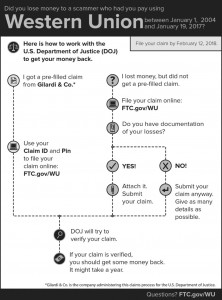Western Union to pay $586 million to cheated customers
18th December 2017 · 0 Comments
By Frederick H. Lowe
Contributing Writer
(Special from NorthStar News Today) — The Federal Trade Commission and the U.S. Justice Department have reached an agreement with Western Union, the world’s largest money-transfer company, to repay $586 million to customers bilked out of their money by fraudsters using Western Union and unscrupulous company employees who assisted the crooks in making the deceptions work.
During a nationwide teleconference on Thursday, FTC officials urged victims of the scams to submit a claim to recover the stolen money before February 12, 2018 to the federal agency. To file a claim, log onto the website Western Union Remission and follow the step-by-step instructions, which are in English and Spanish
Repayment applies to consumers who sent money to fraudsters through Western Union between January 1, 2004 and January 19, 2017. The con artists told consumers to send money through Western Union to receive cash, prizes or services, but the crooks laughed all the way to the bank because no one received anything.The FTC said it will take a year for consumers to receive their money after filing.
Five different fraudulent activities have operated on Western Union.
• Online and Internet scams —you did not receive the funds you tried to secure online;
• Lottery or prize promotion scams—you were told you won a lottery or sweepstakes, but never got the prize;
• Emergency or grandparent scams—you sent money to someone pretending to be a relative or friend in urgent need of money;
• Advance-fee loan scams—you paid upfront fees, but did not get the promised loans;
• Online dating or romance scams—you sent money to someone who created a fake profile on a dating or social networking website.
The FTC and the DOJ reached an agreement in January, settling a lawsuit filed in the U.S. District Court for the Middle District of Pennsylvania in Scranton. The FTC filed the lawsuit under the Federal Trade Commission Act and the Telemarketing and Consumer Fraud Prevention Act
Individuals can file a claim for a family member, friend or client if he or she represents an estate, has power of attorney or an attorney who has signed documents that says the lawyer represents the claimant.
A person also can submit a claim although he or she no longer has the paperwork. If a person has sent money a few times to a scam, he or she also can submit a claim.
The crimes were both inside and outside jobs, according to a 65-page civil lawsuit filed by the FTC against Western Union on January 19.
Under a headline in capital letters, the lawsuit said: “Many Western Union Agents Have been Active in the Underlying Scams.”
Charges against 39 agents have included conspiracy to commit mail fraud, wire fraud and/or money laundering. Most of the agents have already pled guilty or have been convicted of the charges, according to lawsuit. Western Union has more than 50,000 of its 515,000 worldwide agent locations in the United States.
As part of its settlement, Western Union agreed to implement an anti-fraud program and enhanced compliance obligations in agreements with federal authorities.
Western Union is based in Englewood, Colorado.
This article originally published in the December 18, 2017 print edition of The Louisiana Weekly newspaper.




